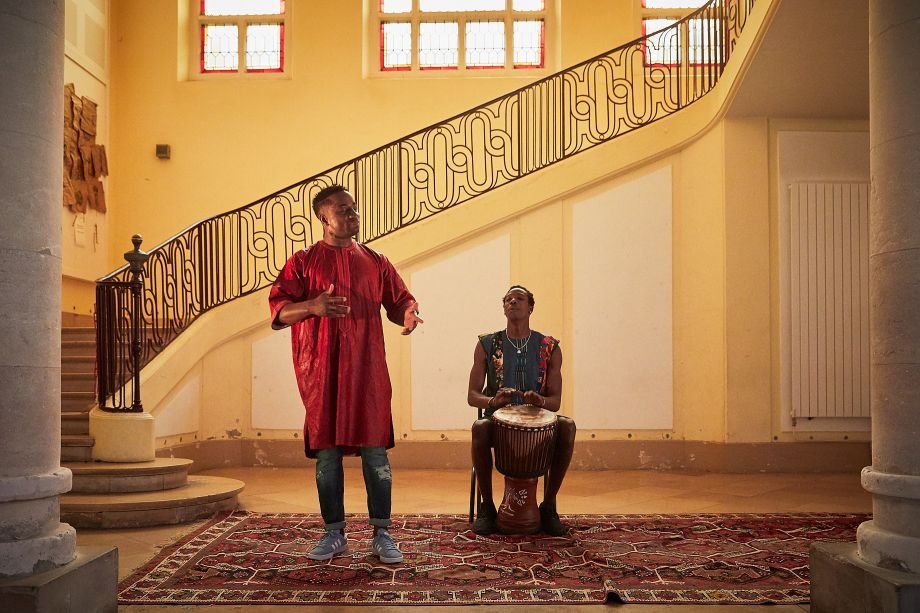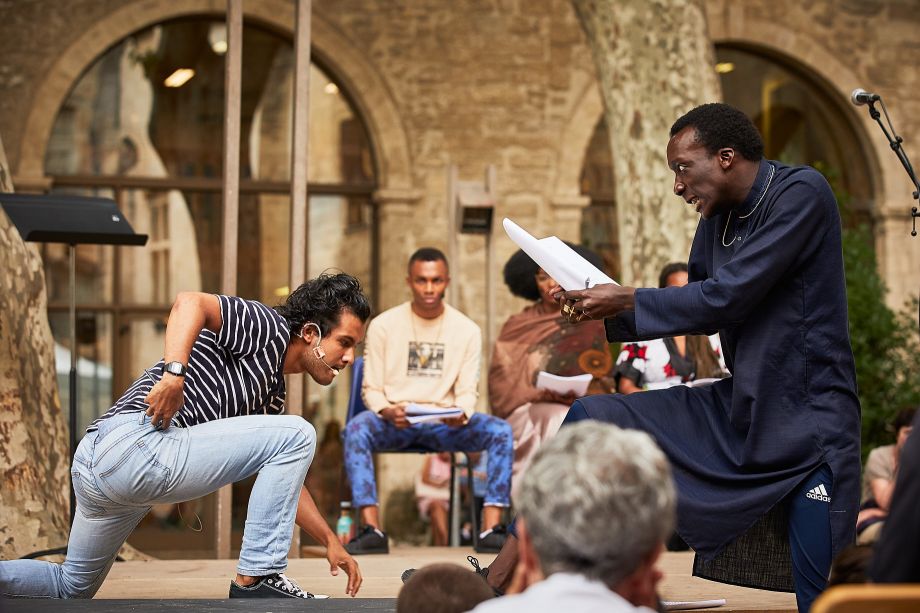Avignon 2019: ‘Young Yacou’ and ‘The Odyssey’ – Adapting the Odyssey in Avignon, 2019

A defining text of Western literature, Homer’s the Odyssey has recently resurfaced as the point of reference in many theatre productions wishing to speak to the conditions of contemporary migration. A narrative of the travel that focuses on being on the road, on the endeavours and the trials that an exilic traveler faces, the Odyssey allows contemporary theatre makers to approximate the impossible. Theatre often speaks in allegories and metaphors – contextualizing these metaphors through the actual experiences of today’s refugees brings these metaphors to life.
Avignon 2019 has seen several examples of staging the Odyssey.
Young Yacou by Yacouba Konaté is one of such performances. Created in the genre of storytelling for children, not only does it narrates the 15 years of Yacouba Konaté’s personal exile, it also provides an example of how suffering of migration can turn into creative energy of making theatre. Young Yacou is not about optimism for the sake of optimism, it is a heartbreaking testimony to how in exile doing arts can be the only tactics of survival and hope. Hungry, scared, and aching for his mother, young Yacou walked on foot and traveled by boat from his native Ivory Coast through Africa to France. He marched alone and with others through the desert, he was imprisoned several times, and he almost drowned on his sea crossing, when finally he reached Milan then Paris. “I travelled through Ghana, Togo, Benin, Nigeria, and Cameroon”, the artist narrates. “A Cameroonian who managed a phone booth told me about Lybia. So I went to Niger and crossed the desert to Lybia. Very few of us survived the crossing. When the crisis in Lybia broke out, we had to flee. But it was too late. We ended up in the Choucha refugee camp. That’s where it all began.”
Trained as an engineer, Yacouba Konaté never thought of doing theatre or singing. “Singing came to me at night. I dreamt of lyrics and in the morning I wrote them down, as if they’d been dictated to me. I worked up the courage to go up the little stand we’d put up in the middle of the camp and to sing to motivate people.” This tactics worked – being on the road forced young Yacou to seek the means of physical but also of spiritual survival; and so out of this pain and horror the artist was born.
In the tiny space of the College Vernet’s courtyard, there is a storyteller and there is a musician. They are Yacouba Konaté and Wally Saho. These artists might be not professionally trained, but in their sincerity, sorrow and energy of survival, their desire to transmit the message of exile takes over. There is the power of theatre, the power of ritual, expressed in peoples’ need to come together and share each other stories, to share each other’s suffering and hope, which reigns over this play.
Young Yacou is probably one of the most emotionally moving productions in this festival. Addressed to the young spectators, it also carries a message – children must exercise their primary right to study, they must go to school and acquire life skills that will help them through the life journey, the journey that can be as scary and unpredictable as one through which young Yacou went. Still, there is hope. Today, Yacouba Konaté lives in Paris, he has a baby-daughter and he practices his art as a storyteller and a singer. In his work, he tries to always engage people into the action: sitting in front of the artist, we also sing and dance together; we are a small community of survivors, learning how to deal with the impossible and how to recognize the pain of the Other through words and music.

Blandine Savetier’s staged-reading of the Odyssey, in the new translation by Philippe Jaccottet, was commissioned by the Festival d’Avignon for its 73rd edition. It was to engage the young actors (aged 18 to 26) of diverse cultural backgrounds currently trained within the 1er Acte programme and aspire to become professional theatre and filmmakers. The experience of working on this project was eye opening both for the director and for her festival audiences. All participants in this project, as Savetier explains, “have a parent or grandparent who was an exile. It’s part of their history, it’s in their memory. Like Ulysses, they live several lives at the same time, and they’re very resilient”. Thus the text of Homer becomes very close to their personal experiences, and thus they bring the energy of the personal loss and seeking truth about the past into this reading. Spoken in different accents of French, but also in Italian, Greek and Spanish, and embodied through the experiences of being Other, visible and audible minorities, in France, these young actors bring new theatrical energy to the festival. In their speaking and walking of the text, they make the myths of Homer come live. On stage is a chorus of bodies and voices: they all can be the Ulysses and so several performers enact this famous traveler seeking his way home. The voices are the major vehicles of this story with the sounds of the drums, created by the Japanese percussionist Yuko Oshima, to underscore it.
Attending this performance on the weekend of July 14, 2019, when France celebrated the 230 anniversary of its revolution that brought forward “liberté, égalité, fraternité” , the three values of democratic society, the organizers of the Avignon Festival also hold a special series of meetings with the Refugees and Migrants campaign for Amnesty International France. Not only they invited Pascal Brice former managing director of the OFPRA, Alpha Kaba Guinean, author of the book Esclave des milices, and Lola Schulmann defence lawyer Refugees and Migrants for Amnesty International France to discuss the situation with the migration policies in France, through engaging the diverse cast of Savetier’s the Odyssey they demonstrated that integration of the diversity and acceptance of the other is possible, at least in theatre, at least through Homer.
Young Yacou
Text Yacouba Konaté
With Yacouba Konaté, Wally Saho
Music Yacouba Konaté, Wally Saho
Production atelier des artistes en exil, co-hosting Festival d’Avignon, Là ! C’est de la Musique
in partnership with France Médias Monde
Collège Vernet, Avignon Festival, July 13-17, 2019
and
l’Odyssey by Homer ,translated by Philippe Jaccottet
Montage and dramaturgy Blandine Savetier, Waddah Saab
Direction Blandine Savetier
With Aline Belibi, Elan Ben Ali, Neil-Adam Mohammedi, Yuko Oshima, Julie Pilod, Jordan Rezgui, Souleymane Sylla and amateurs, theater-loving citizens of Avignon
Composition, percussions Yuko Oshima
Production Festival d’Avignon, Compagnie Longtemps je me suis couché de bonne heure, Théâtre national de Strasbourg, in io-production Festival Musica (Strasbourg), with the support of Fondation SNCF, sponsoring for 5 years the feuilleton du jardin Ceccano, SACD, Région Grand Est,with the artistic participation of Jeune théâtre national, Odéon-Théâtre de l’Europe, les Plateaux sauvages (Paris), Theo Angelopoulos Heirs Association, and in collaboration with bibliothèque Ceccano, Avignon
Jardin Ceccano, Avignon Festival, July 6-20, 2019